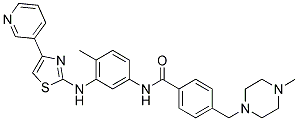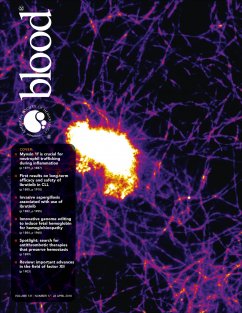
Masitinib (AB1010) is a tyrosine kinase inhibitor targeting stem cell factor receptor (c-kit) and platelet-derived growth factor (PDGF) receptor. It can enhance the antiproliferative effects of gemcitabine (GEM) in human pancreatic cancer cells. It potently inhibited human and murine KIT with activating mutations in the juxtamembrane domain. In vivo, masitinib (AB1010) blocked tumour growth in mice with subcutaneous grafts of Ba/F3 cells expressing a juxtamembrane KIT mutant. Masitinib, a c-kit and PDGF-receptor tyrosine kinase inhibitor, may represent an innovative avenue of treatment in corticosteroid-dependent asthma.

bioRxiv. 2021 May 23;445261.
Non-coding NFKBIZ 3′ UTR mutations promote cell growth and resistance to targeted therapeutics in diffuse large B-cell lymphoma
Masitinib purchased from AbMole

Blood. 2018 May 24;131(21):2345-2356.
Pan-SRC kinase inhibition blocks B-cell receptor oncogenic signaling in non-Hodgkin lymphoma.
Masitinib purchased from AbMole
| Cell Experiment | |
|---|---|
| Cell lines | Ba/F3 cell |
| Preparation method | For the assay of Ba/F3 cell proliferation, microtitre plates were seeded with a total of 104 cells/well in 100 µl of RPMI 1640 medium with 10% foetal bovine serum at 37°C. These were supplemented, or not, with either 0.1% conditioned medium from X63-IL-3 cells or 250 ng/ml murine SCF. The murine SCF, which activates KIT, was purified from the conditioned medium of SCF-producing CHO cells (gift of S. Lyman, Immunex). Cells were grown for 48 hours at 37°C and then incubated with 10 µl/well of WST-1 reagent (Roche Applied Science, France) for 3 hours at 37°C. The amount of formazan dye formed was quantified by its absorbance at 450 nm using a scanning multiwell spectrophotometer (MultiSkan MS, Thermo-LabSystems, France). A blank well without cells was used as a background control for the spectrophotometer and all assays were performed in triplicate. |
| Concentrations | 0~10 μM |
| Incubation time | 48 h |
| Animal Experiment | |
|---|---|
| Animal models | Ba/F3 Δ27 tumour model in Female MBRI Nu/Nu mice |
| Formulation | placebo |
| Dosages | 10, 30, or 45 mg/kg twice daily for 10 days |
| Administration | orally |
| Molecular Weight | 498.64 |
| Formula | C28H30N6OS |
| CAS Number | 790299-79-5 |
| Solubility (25°C) | DMSO ≥100 mg/mL |
| Storage |
Powder -20°C 3 years ; 4°C 2 years In solvent -80°C 6 months ; -20°C 1 month |
| Species | Mouse | Rat | Rabbit | Guinea pig | Hamster | Dog |
| Weight (kg) | 0.02 | 0.15 | 1.8 | 0.4 | 0.08 | 10 |
| Body Surface Area (m2) | 0.007 | 0.025 | 0.15 | 0.05 | 0.02 | 0.5 |
| Km factor | 3 | 6 | 12 | 8 | 5 | 20 |
| Animal A (mg/kg) = Animal B (mg/kg) multiplied by | Animal B Km |
| Animal A Km |
For example, to modify the dose of Compound A used for a mouse (20 mg/kg) to a dose based on the BSA for a rat, multiply 20 mg/kg by the Km factor for a mouse and then divide by the Km factor for a rat. This calculation results in a rat equivalent dose for Compound A of 10 mg/kg.
| Related VEGFR/PDGFR Products |
|---|
| Isolinderalactone
Isolinderalactone suppresses human glioblastoma growth and angiogenic activity through the inhibition of VEGFR2 activation in endothelial cells. Isolinderalactone suppressed the expression of B-cell lymphoma 2 (BCL-2), as well as of survivin and X-linked inhibitor of apoptosis protein (XIAP). |
| Oglufanide
Oglufanide (H-Glu-Trp-OH) is a dipeptide immunomodulator isolated from calf thymus. |
| KLTWQELYQLKYKGI
KLTWQELYQLKYKGI (QK) is a VEGF mimicking peptide, binds to the VEGF receptors and competes with VEGF. |
| Protein LMWP
Protein LMWP is a cell-penetrating peptide with vascular endothelial growth factor (VEGF) inhibitory activity. |
| CBO-P11
CBO-P11 specifically binds to receptor of VEGFR-2 and is used as targeting ligand for tumor angiogenesis. |


Products are for research use only. Not for human use. We do not sell to patients.
© Copyright 2010-2023 AbMole BioScience. All Rights Reserved.
